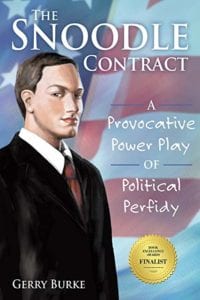
Shelf Unbound: You’ve written a number of humorous mystery novels starring Aussie detective Paddy Pest. Tell us about Pest and about how you created him.
Gerry Burke: Patrick Pesticide aka Paddy Pest is an extension of a pseudonym I gave myself as a freelance writer. I wrote opinion pieces and commentary on Politics, Entertainment, Sport and Travel. You have to be a bit of a pest to get your work published in the general media and so I maintained the name when my character also exhibited these tendencies. To my readers I explained that he acquired this moniker at a gentleman’s club, where his stunningly beautiful consort, Stormy Weathers, worked. The place is owned by Australia’s foremost intelligence agency and all the female employers are spies. The girls all claimed he was a pest and this is understandable. He is a shameless and dissolute ladies’ man and cheats on Stormy at every opportunity. Nevertheless, I have managed to paint him as a lovable rogue.
Shelf Unbound: Your latest adventure has Pest coming to the rescue of a Republican president seeking re-election.
Burke: Paddy is a frequent visitor to North America, even though there are people who are always keen to revoke his visa. In his youth, he worked for MI6 and acquired spycraft skills and thus he is in demand by foreign governments for jobs that are deniable. However, who would have thought he would have ended up as a bosom buddy of President Gus Snoodle?
Shelf Unbound: How did you develop your humorous writing style?
Burke: A number of reviewers have made comparisons of my style to various American writers I was not familiar with (although I later learned who David Sedaris was). I am not conscious of any writing style other than the fact that I am not ponderous; probably due to my experiencing the demands of writing good advertising copy: communicate quickly. I liked to entertain and be clever and my ads were mostly humour orientated. There’s a certain amount of acerbic wit locked away in my brain somewhere, and I often like to play with words, even if many of the readers miss the inference.
